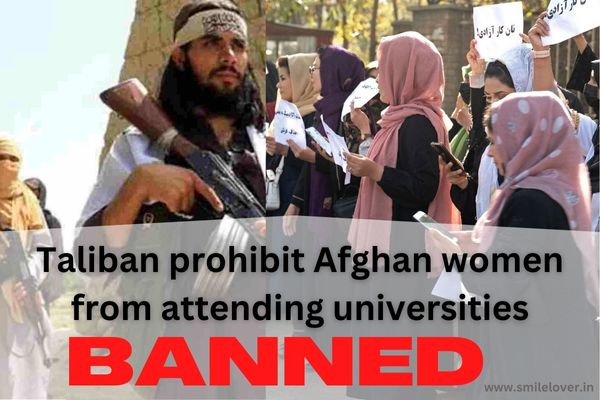TALIBAN PROHIBIT AFGHAN WOMEN FROM ATTENDING UNIVERSITIES

Three months after hundreds of people took admission tests, the minister of higher education announces an indefinite order.
According to a letter the ministry of higher education sent to all public and private universities, Afghanistan's Taliban leaders have ordered a permanent ban on women attending the country's universities.
The letter, which was signed by Neda Mohammad Nadeem, the minister of higher education, stated that "you all are informed to implement the mentioned order of halting education of females till further notice."
The directive was confirmed by the ministry's spokesperson, Ziaullah Hashimi, who also tweeted the letter, in a text message to Agence France-Presse.
Meena, a 52-year-old instructor in Afghanistan who went by a pseudonym out of concern for reprisals, said, "My female students are sad and I don't know how to comfort them." One of them relocated to Kabul from a rural district and overcame several obstacles to enrol at this prominent university. Her dreams and aspirations were all dashed today.
Meena said she could understand her student's anxieties because she was in college when the Taliban last took control in the late 1990s. "Last time they were in power, I lost a significant portion of my education. I also knew that the Taliban would prohibit girls from attending universities the day they took control of Kabul.
With their cellphones, social media accounts, and fancy automobiles, they may appear to be a different group, but they are still the Taliban who denied me an education and are now destroying my students' futures, she claimed.
Exiled child rights campaigner Prof. Manizha Ramizy claimed that her female pupils had sent her anxious texts.
She remarked, "They are horrified and scared, looking at a gloomy future.
She noted that despite months of ever-tighter restrictions, many Afghan women had held out faith that access to education would continue.
"They would gripe to me about how they were treated unfairly in society and in the school. Although it was a terrible experience, at least they will graduate shortly and realise their full potential. Now everything is gone, she declared.
The ban on higher education was enacted less than three months after thousands of girls and women across the nation took university entrance tests, with many of them hoping to pursue professions in engineering and medicine.
Universities were compelled to establish new regulations following the hardline Islamists' takeover of Afghanistan in August of last year. These regulations included gender-segregated classrooms and entrances, and women were only allowed to be taught by female professors or elderly males.
The majority of Afghan teenage girls are already prohibited from attending secondary schools, drastically restricting their access to higher education.
Madina, a journalism student, admitted that she was finding it difficult to grasp the gravity of Tuesday's order.
"I am at a loss for words. The 18-year-old stated, "Not only me, but all of my pals, lack the language to adequately convey our thoughts. "Everyone is contemplating their uncertain future. They interred our hopes.
An international outcry condemned the action, and the US issued a warning that the Taliban would be held accountable.
According to state department spokesman Ned Price, "This unacceptable posture will have substantial repercussions for the Taliban and further alienate the Taliban from the international community."
Ramiz Alakbarov, the secretary general's deputy special representative for Afghanistan, stated that the UN was "very worried" by the directive.
He tweeted, "Education is a fundamental human right. A door closed to women’s education is a door closed to the future of Afghanistan".
The closure of universities to women and girls is a terrifying step backwards for Afghanistan, the International Rescue Committee warned in response to the ban. There is no way around it: girls must be permitted to stay in school and women must have the freedom to work and travel.
The Taliban follow a strict interpretation of Islam, and Hibatullah Akhundzada, the movement's ultimate leader, and his inner circle of Afghan clerics are opposed to contemporary education, especially for children and women.
They disagree with many Kabul leaders and some of their rank and file, however, who had hoped that girls would be let to continue their education following the takeover.
Many government jobs for women have been eliminated, or they are being paid less to stay at home. They must wear clothing outside the home, preferably a burqa, and are prohibited from travelling alone or without a male relative.
They were not allowed to visit parks, fairs, gyms, or public bathhouses in November.
When secondary schools were slated to reopen in March, the Taliban made a nasty U-turn and forbade girls from going back on the scheduled opening day.
A number of Taliban officials claim the closure of secondary schools is merely temporary, although they have provided a long list of justifications, ranging from a shortage of funding to the need for time to modify the curricula to reflect Islamic principles.







